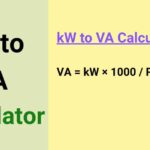kVA to kW Calculator
Calculation Formula
Power (kW) = Apparent Power (kVA) × Power Factor
Result: Kilowatts (kW)
When dealing with electrical systems, finding the right kVA to kW Calculator is essential.
I’ve personally used these calculators to simplify complex power conversions, and trust me, they’re a lifesaver.
Whether you’re working on a generator, equipment load, or power consumption, this tool will make your job easy and precise.
What is kVA to kW? – A Quick Overview
kVA is a measure of apparent power, while kW is a measure of real power.
The difference between kVA and kW comes from the power factor (PF), which shows how efficiently electrical power is used.
Formula:
kW = kVA × Power Factor (PF)
For example:
1 kVA = 0.8 kW when using a common power factor of 0.8.
Also Check: kW to kVA Calculator
Why You Should Use the kVA to kW Calculator
I’ve used the kVA to kW Calculator many times to quickly and accurately convert electrical units. This tool is especially helpful when you want to:
- Easily convert apparent power (kVA) to real power (kW)
- Accurately size generators and electrical equipment
- Calculate power for both single-phase and three-phase systems
- Save time with fast, reliable calculations
Use the calculator to convert between kVA and kW without doing manual math – it’s that simple!
Also Check: Watts to kVA Calculator
How to Convert kVA to kW Using Our Easy Calculator
It’s very straightforward. Just input:
- The kVA value
- The power factor
The calculator will instantly provide the real power in kilowatts (kW).
Formula to Remember:
kW = kVA × PF
Example:
If you have 5 kVA and the power factor is 0.8, then:
kW = 5 × 0.8 = 4 kW
With this tool, you can also convert kW, kVA, amps, and HP without hassle.
Also Check: EV Calculator
kVA to kW Conversion Table (Power Factor 0.8)
| kVA | Power Factor (PF) | kW |
|---|---|---|
| 1 | 0.8 | 0.8 |
| 5 | 0.8 | 4.0 |
| 10 | 0.8 | 8.0 |
| 20 | 0.8 | 16.0 |
| 50 | 0.8 | 40.0 |
| 100 | 0.8 | 80.0 |
Key Features of the Calculator
- Fast and accurate results
- kVA to kW Calculations based on real-world electrical formulas
- Supports kW to kVA conversion
- Includes kVA/kW Amperage Chart
- Can calculate and convert between kVA, Amps, Volts, kW, and Power Factor
You can even download our power conversion calculator for offline use, which I’ve found super helpful in field applications.
Also Check: kVA to Amps Calculator
Important Points to Know
- Kilowatts are equal to kilovolts multiplied by amperes and the power factor.
- kVA to kW conversion calculators are widely used in generator sizing and load calculations
- kVA is a measure of apparent power, not the actual usable power
- Convert kW to kVA using an easy calculator for reverse calculations
Also Check: Watt to kWh Calculator
Why This Calculator is Perfect for You
From my experience, this calculator is useful, accurate, and extremely reliable. It’s great for estimating generator size, electrical load, and power factor adjustments.
Whether you’re an engineer, technician, student, or someone handling electrical equipment, this tool simplifies complex conversions.
Also Check: Kilowatts to Amps Calculator
FAQs
How many kW is 1 kVA?
1 kVA is equal to 0.8 kW when using a power factor of 0.8, which is commonly used in electrical systems.
How do I convert kVA to kW?
You can convert kVA to kW by multiplying kVA by the power factor (kW = kVA × PF) using a simple kVA to kW calculator for quick results.
How many kVA is 1 kWh?
1 kWh is not directly equal to kVA; kVA measures apparent power, while kWh measures energy used over time. You need the power factor and usage time to calculate it.
What is 2000W in kVA?
2000W is approximately 2.5 kVA when assuming a standard power factor of 0.8 (Formula: kVA = kW ÷ PF).
How to convert HP to kVA?
To convert HP to kVA, multiply HP by 0.746 to get kW, then divide by the power factor (Formula: kVA = (HP × 0.746) ÷ PF).
Final Thought
Using a kVA to kW Calculator has truly made my work faster and more accurate. Whether you’re selecting a generator or estimating electrical loads, this tool simplifies complex calculations into quick, reliable answers.
From my own experience, I highly recommend using this calculator for everyday electrical tasks — it’s simple, user-friendly, and saves valuable time.










